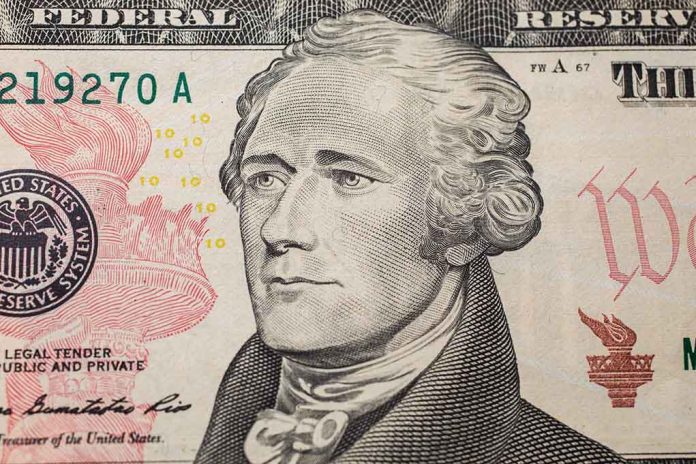
(RepublicanView.org) – Little did anyone know a boy born on January 11, 1755, in the British West Indies would have such an enormous impact on history. Alexander Hamilton became one of America’s most influential founding fathers. He fought for the beliefs of the greater good and became a key player in transforming the Continental Army.
A Struggle Early On
Hamilton was born into poverty. His mother struggled to support herself and her sons, even becoming involved in a couple of failed marriages. Like many other poor children of the time, Hamilton went to work at the age of 11 to help support his family. When his mother died a few years later, Hamilton busied himself with work and school.
A Self-Made Man
One of Hamilton’s first jobs, through a prosperous merchant, provided him exposure to international commerce. As an accounting clerk, he learned insider tricks and tactics that would lead to the knowledge and experience of business, trades, and money. His employer eventually sent him to America for a post-secondary education, where he enrolled at King’s College (Columbia University).
Before graduating from college, Hamilton joined forces with the Patriots and fought in the Revolutionary War. In 1777, he received a promotion to Lieutenant Colonel of the Continental Army as he fought for American independence.
His writings and military success quickly caught the attention of George Washington, who later hired him as his assistant and advisor.
George Washington’s Right Hand
As George Washington’s chief staff aide de camp, Alexander Hamilton composed letters and other correspondence to powerful heads of state, Congress, and generals of the Army. While successful, Washington and Hamilton eventually had a falling out over a misunderstanding. The conflict ultimately prompted Hamilton to leave his position as aide de camp, join a battalion, and angle for a field command position. Washington finally relented, and Hamilton eventually became a Major General.
Post-War Accomplishments
After the war, Hamilton returned to New York and took the bar exam, passing after only six months of self-education. This accomplishment eventually landed him a job with Robert Morris as a receiver of continental taxes.
He joined Congress in 1782, hoping to collect taxes to supplement the Army and soldiers’ salaries. Overwhelmed with defeat, Hamilton resigned from Congress in 1783.
In 1784, Hamilton founded one of the oldest banks in the US, the Bank of New York. He also played a pivotal role in the Annapolis Convention of 1786, drafting a resolution for a constitutional convention to embark on a more independent and financially secure government. Based on his ideals of stability, Hamilton proposed the ideas of a President-For-Life and elected senators who would also serve life terms. Critics, led by James Madison, labeled Hamilton a monarchist sympathizer.
The Federalist Papers
Perhaps the most influential and formative contribution Hamilton made was writing a series of essays with John Jay and James Madison, known as The Federalist Papers in 1787. The men published the essays to defend the proposed Constitution and explain its strengths. They highlighted the confederation’s need for unity against foreign adversaries and the disadvantage of splitting the newly formed confederacy into rivaling factions. The Federalist Papers also stressed the Constitution’s series of legislative checks and balances and the natures of representation in a republic through appointed legislators represented by electors.
Secretary of the Treasury
Washington and Hamilton maintained a professional relationship, even if the men never developed a close friendship and despite misunderstandings. When Washington was elected president of the United States, he nominated Hamilton as the first Secretary of the Treasury. Appointed on September 11, 1789, Hamilton worked over the next five years to oversee matters regarding the Treasury Department. He developed financial reports and projects that helped form the agency become what it is today. He also submitted the report to establish the US Mint.
The Legacy of Alexander Hamilton
Today, most people know Hamilton best as the face on the $10 bill, which has sported his likeness since 1929, or the namesake of the popular eponymous Broadway play. Although he made profound contributions to the formation of the nation, he never became president. He and Benjamin Franklin are the only two non-presidents commemorated on paper currency.
Perhaps Hamilton was one of America’s first rags-to-riches success stories: He started as an impoverished child, became a successful accountant, transitioned to a brilliant military career, and ultimately became an influential statesman. But Hamilton’s story ended prematurely.
A long-standing disagreement between Aaron Burr, the third Vice President of the United States, and Hamilton festered after a reported insult. Burr challenged Hamilton to a duel to satisfy his honor, and Hamilton accepted to maintain his.
According to witnesses, the men shot almost simultaneously, and conflicting reports exist about who actually shot first. Hamilton missed, perhaps on purpose. Burr shot Hamilton center of mass in the abdomen, a fatal blow.
Hamilton shaped much of our nation’s government, including the separation of powers, representative government, the monetary system, and much more. Without his influence, our system of government might have been much different. He died before the age of 50. How much more might he have influenced the nation had he lived?
Copyright 2022, RepublicanView.org

















